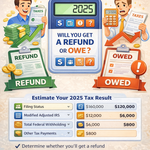Just answer a few simple questions about your life, income, and expenses, and our free tax calculator will give you an idea if you should expect a refund and how much, or if you’ll owe the IRS when you file taxes in 2023. Don’t worry about being exact – just do the best you can. You always have the option to go back and get a new tax refund estimate, especially if your tax situation significantly changes.













